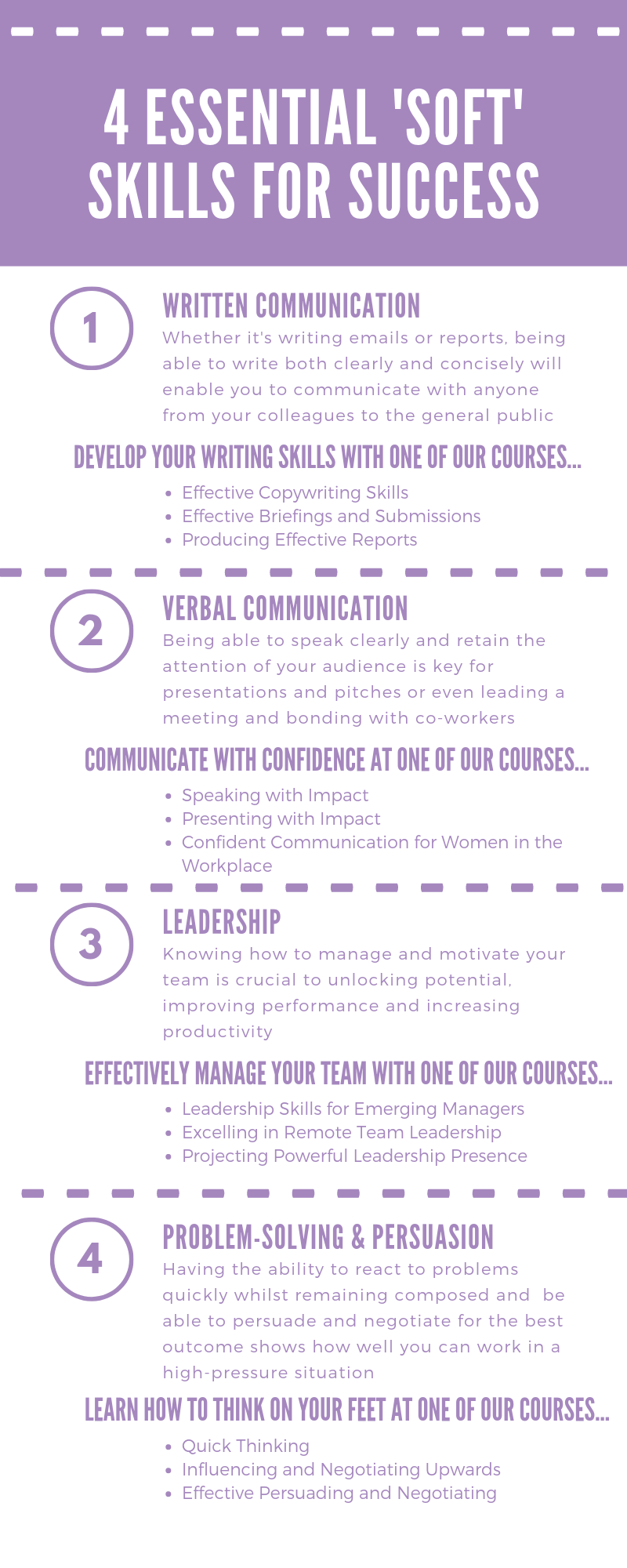4 Essential Soft Skills for Success in the Public Sector
 Chloe Martin
·
4 minute read
Chloe Martin
·
4 minute read
How much do you value your ability to communicate, be part of a team or manage your time effectively? Do you recognise these as important skills?
Soft skills are becoming increasingly important, making them just as necessary as having technical or ‘hard’ skills.
Hiring managers will often spend more time focusing on your soft, interpersonal skills rather than your technical skills. You may find this frustrating, as hard skills take lots of time to master, but soft skills are just as important in 2024.
What are Soft Skills?
Soft skills are also sometimes referred to as transferable skills or interpersonal skills. These are the type of skills which are more closely linked to your personality, qualities and how you behave as a person.
These types of skills include communication, resilience, empathy, problem-solving, time management, leadership, flexibility, responsibility and self-motivation (to name a few).
Why are Soft Skills Important When Working in the Public Sector?
Working in the public sector means you have a direct impact on making a difference to people in a variety of communities with different needs.
As the need for empathy and understanding grows, having ‘soft’ people skills is important to create both personal, professional and organisational success.
As you will probably already know, there are many different areas which make up the public sector, including:
- Local Government
- Central Government
- Government Agencies
- Armed Forces
- Healthcare
- Emergency Services
- Schools, Further Education and Higher Education
- Charities
Each of these different sectors requires various soft skills, but there are four essential ones needed for success.
4 Essential Soft Skills for Success in the Public Sector
1. Written Communication
Whether it's writing emails, reports, effective minutes or speeches, being able to write both clearly and concisely will enable you to communicate with anyone from your colleagues to the general public or stakeholders.
Why Setting Writing Goals is Important and How You Can Set Your Own
2. Verbal Communication
Being able to speak clearly and retain the attention of your audience is key for presentations and pitches or even leading a meeting and bonding with co-workers. This soft skill is particularly important if you have direct contact with service users. For example, if you respond to complaints, you need to know how to actively listen, understand what that person needs and be empathetic to their situation or feelings.
Anxious when speaking in meetings? Read our 8 tips on overcoming speaking anxiety in meetings and presentations.
3. Leadership
Knowing how to manage and motivate your team is crucial to unlocking potential, improving performance and increasing productivity.
From improving service delivery, managing a hybrid workforce and knowing how to listen to your employees, leadership skills are one of the top skills the sector needs in 2024.
To help you start improving your leadership skills, download your free copy of our Leadership Skills for Public Sector Professionals Handbook using the button below.
4. Problem Solving & Persuasion
Having the ability to react to problems quickly while remaining composed, persuasive and strong in negotiation shows how well you can work in a high-pressure situation.
Although the public sector is in a better position than during the pandemic, things can still be unpredictable. So, being able to step back, view the bigger picture when it comes to strategy and solve issues is important.
Related: Why is Critical Thinking Important in the Public Sector?
Share or save this handy graphic below to remember the 4 key soft skills for success. Tell us how you're going to improve these essential soft skills on Twitter by tagging us @UModernGov or find us on LinkedIn.
How to Improve Soft Skills at Work
Now that you know the top 4 essential soft skills for success, the next step is creating a clear action plan to develop these areas.
Don't know where to start? We've got you covered.
Here are 5 soft skills development tactics to enhance your impact, productivity, and team synergy at your organisation:
1. Receive Regular Feedback
One of the most impactful ways to enhance your skillset is by welcoming constructive feedback from your manager.
Many organisations hold regular performance reviews. This is an excellent opportunity to discuss your soft skills, areas of improvement, strengths and goals.
Following your performance review, you can begin to develop a self-improvement strategy, either independently or with your manager. This should include clear and actionable goals of the soft skills you would like to improve, as well as a realistic timeline of when you would like to achieve this by.
You might be interested in: 4 Very Different Methods of Giving Effective, Fair Feedback
2. Prioritise Which Soft Skills to Develop
Take some time to self-reflect and decide what your areas of strength are, and what areas you would like to improve most.
Make sure the goals you set are realistic and achievable. Don't promise yourself that you will attend 10 courses by the end of the year. Your goals should be practical and give you a sense of accomplishment when completed.
If you have a clear career path in mind then your areas of improvement will revolve around this goal.
For example, if you are looking to move into a managerial role, you will want to make sure that you possess the soft skill of good verbal communication. This will enable you to deliver good presentations, communicate clearly to your team and creates efficiency.
You might be interested in: 5 Ways Developing your Verbal Communication Skills Can Fast-Track your Career Progression
3. Try New things
Your skillset won't expand if you are not making any active changes. So it is important to seek out new opportunities and try something you don't often do in your current job role.
For example, this could include volunteering to give a presentation or leading a project.
Trying things outside of your comfort zone will challenge you to use soft skills you have never used before. This will make you a more well-rounded employee.
Also being able to adapt to these new experiences signifies to senior staff that you are ready for a leadership role.
You might be interested in: 5 Crucial Leadership Skills for New Managers
4. Pursue Training
Enhancing your soft skills doesn't have to be entirely internal.
Seeking expert guidance can provide valuable insights into your objectives and guide you through a step-by-step approach to accomplishing them.
You can find numerous online courses and resources that will help you improve specific soft skills. These will range widely in quality. Therefore, we recommend that you choose reliable sources like reputable providers of public sector training courses.
Understanding Moderngov offers a wide range of CPD certified soft skill courses led by experts. Check out our upcoming courses on our website.
5. Learn from Others
Observe how your colleagues use their soft skills in the workplace to identify who succeeds at using skills like communication, time management and collaboration so you can follow by example.
For example, you can observe your manager when they hold a meeting, your colleague when they give a presentation, or customer service when they handle a customer complaint and many others.
After observing someone using their soft skills, make a note of their achievements, areas for improvement, and consider how you can implement their successful strategies in your own circumstances.
Want to Learn How to Apply These Soft Skills?
We've got a range of upcoming courses that will help develop your soft skills as a public sector professional. View the full list and book a place here.
2+ years in SEO and content marketing. Striving to help public sector professionals develop their skills and learn something new through high-quality content.








